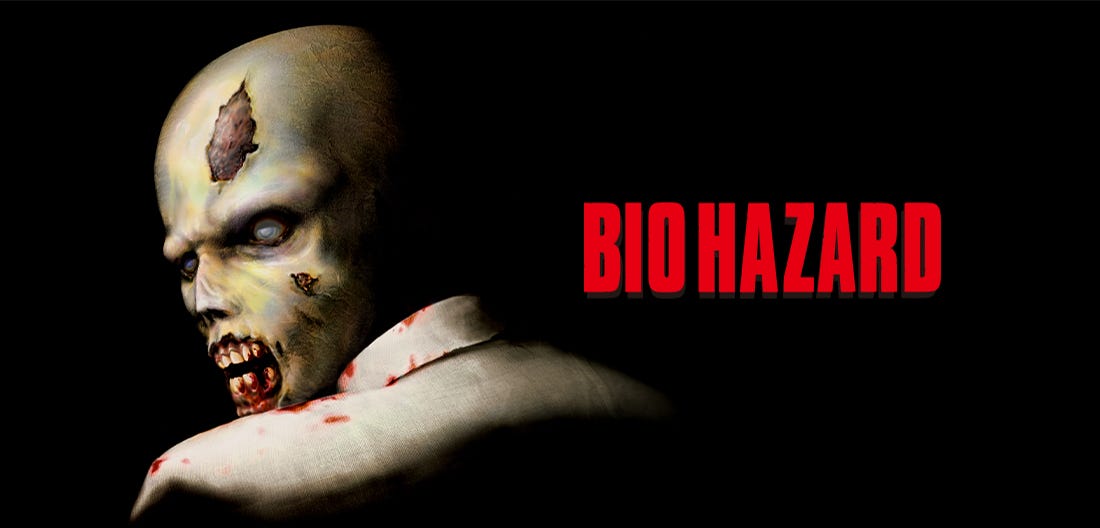Why hasn’t Capcom re-released the original Resident Evil trilogy recently?
A look at what makes such rereleases so challenging to create
Today, I want to talk a little about the original Resident Evil trilogy, comprising of Resident Evil (1996), Resident Evil 2 (1998) and Resident Evil 3: Nemesis (1999), and why they haven’t been ported to any modern platform in nearly two decades.
This week, the “Resident Evil Seamless HD Project” released its 1.0 Pack for the original 1996 title, and for dedicated RE fans, this is truly a moment worth celebrating.

For those that don’t know, the “Seamless HD Project” uses machine learning to upscale the series’ classic pre-rendered backgrounds to resolutions fit for modern HD and 4K TVs, in combination with the technology of Dolphin, a community-developed emulator that runs GameCube and Wii titles on PCs and other hardware. RE2 and RE3’s Seamless HD releases utilize the 2003 GameCube ports of those titles; what the technology essentially does is runs the original GameCube games and swaps out the original visuals for machine learning upscaled renditions through a specialized version of the Dolphin emulator. This is a massive oversimplification of the complexity of the Seamless HD Project, and those who want to know more should engage the developers directly for a more concrete explanation of how this amazing technology works.
However, the Seamless HD’s dependency on Dolphin has meant that while RE2 and RE3 were restored several years ago, the 1996 original required a different approach. As most readers should know, the GameCube received a remake of the original RE in 2002, and this remake is playable on all major modern platforms today. Therefore, the Seamless HD developers had to rely on a very specific Japan-only PC port of the 1996 original, which was originally intended for Windows 95 and 98, in order to restore this title. The developers were tasked with not only upscaling the most ancient of 3D RE visuals to modern resolutions, but they also needed to modify it to run on modern PCs as well. In July 2023, after months of various prototypes, the 1.0 Pack is now out, and the results are marvelous.
And yet as a fan, I can’t help but long for an official offering from Capcom. While the completion of the Seamless HD trilogy is welcome news for those looking for modern ways to play the original RE trilogy, it does beg the question: why isn’t Capcom doing something like this themselves? Seamless HD is great for owners of gaming PCs, but if anything, I would love to (officially) play the original RE trilogy on Nintendo Switch, anywhere I want. (The PlayStation Vita is great for this, of course, but it’s also old.)
In the past twenty years, Capcom hasn’t shied away from tapping into classic entries in its Mega Man, Street Fighter and even ‘80s-era arcade titles. Many of them, such as the Mega Man Legacy Collection, Street Fighter 30th Anniversary Collection, Phoenix Wright: Ace Attorney Trilogy and the Capcom Arcade Stadium have become million sellers, showing that a not-insignificant number of gamers are at least willing to pay for Capcom’s classic content.
Before I begin my analysis, I want to point out that the original RE, specifically Resident Evil: Director’s Cut (1997) is in fact playable on the PlayStation 4 and PlayStation 5. In June 2022, Sony revamped its PlayStation Plus program to offer certain classic games on the original PlayStation and PlayStation 2 to people who subscribe to the service; one of the first titles was REDC. It’s barebones as far as rereleases go, but Sony’s emulator introduces rewind and instant-save functions to the game for the first time, which is neat.
But as of July 2023, only the original RE is available on PS Plus, with RE2 and RE3 nowhere to be seen. And these PS Plus editions don’t mean anything to owners of Switch or Xbox platforms, nor do they contain the extra content and quality of life updates remasters and/or collections often feature. Who wouldn’t want to have every version of the original RE, even the lambasted Dual Shock Edition, in one package?
So why has Capcom neglected the classic RE trilogy in this regard, despite the classic RE trilogy being indisputably some of their most cherished titles?
The remakes are considered complete replacements of the originals
I want to begin with the most obvious answer here: for Capcom and a vast majority of casual RE fans, the 2002, 2019 and 2020 RE remakes are complete replacements of their respective originals. The remakes are more modern and accessible, offer better gameplay, writing, visuals, and voice acting, greater cohesion with other titles, a more developed story, and so forth. (Whether a given remake is better than its original is down to personal taste; the 2020 RE3 remake is extremely divisive in this regard.)
By virtue of their production values alone, the remakes are far more appealing to the average RE fans in 2023 than the originals could ever hope to be at this point. The originals are archaic and will likely only appeal to fans who were there from the series’ early days, or younger people who are into retro games as a hobby. There are many such folks, but RE is also Capcom’s most commercialized IP, and as a result the company needs to be careful with what they decide to release. A classic RE trilogy, while low risk in the grand scheme of things, might not offer the same sort of return on investment that the continued promotion of the remakes offers today.
As I said above, that’s the most obvious answer, and the one you probably didn’t subscribe to this Substack to read. Continue reading for reasons you may not have thought of.
Keep reading with a 7-day free trial
Subscribe to Complete Global Saturation to keep reading this post and get 7 days of free access to the full post archives.

